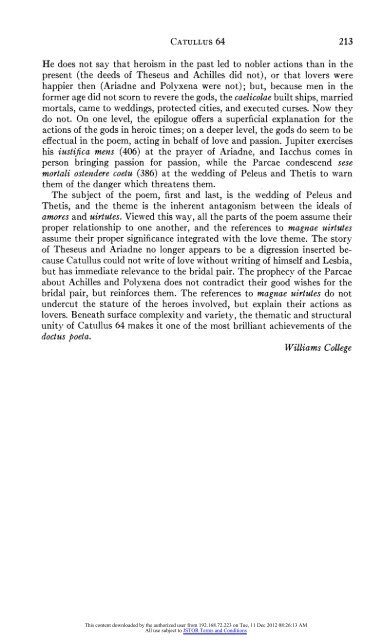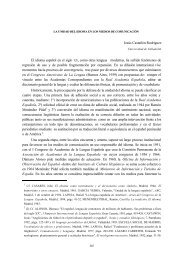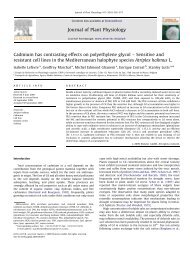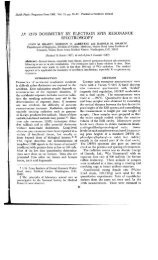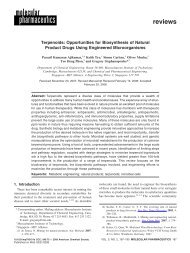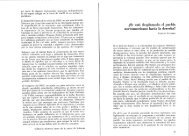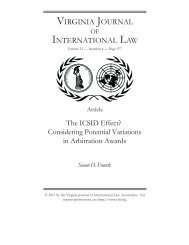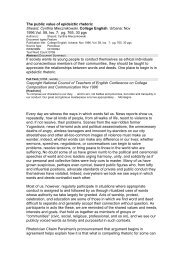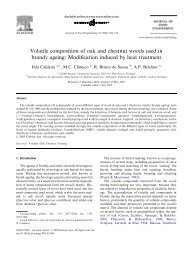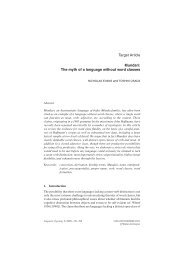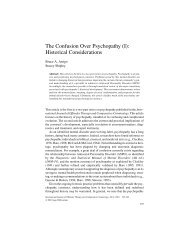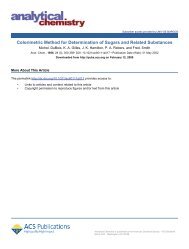Catullus 64 and the Conflict between A mores and Virtutes
Catullus 64 and the Conflict between A mores and Virtutes
Catullus 64 and the Conflict between A mores and Virtutes
Create successful ePaper yourself
Turn your PDF publications into a flip-book with our unique Google optimized e-Paper software.
CATULLUS <strong>64</strong> 213<br />
He does not say that heroism in <strong>the</strong> past led to nobler actions than in <strong>the</strong><br />
present (<strong>the</strong> deeds of Theseus <strong>and</strong> Achilles did not), or that lovers were<br />
happier <strong>the</strong>n (Ariadne <strong>and</strong> Polvxena were not); but, because men in <strong>the</strong><br />
former age did not scorn to revere <strong>the</strong> gods, <strong>the</strong> caelicolae built ships, married<br />
mortals, came to weddings, protected cities, <strong>and</strong> executed curses. Now <strong>the</strong>y<br />
do not. On one level, <strong>the</strong> epilogue offers a superficial explanation for <strong>the</strong><br />
actions of <strong>the</strong> gods in heroic times; on a deeper level, <strong>the</strong> gods do seem to be<br />
effectual in <strong>the</strong> poem, acting in behalf of love <strong>and</strong> passion. Jupiter exercises<br />
his iustifica mens (406) at <strong>the</strong> prayer of Ariadne, <strong>and</strong> Iacchus comes in<br />
person bringing passion for passion, while <strong>the</strong> Parcae condescend sese<br />
mortali ostendere coetu (386) at <strong>the</strong> wedding of Peleus <strong>and</strong> Thetis to warn<br />
<strong>the</strong>m of <strong>the</strong> danger which threatens <strong>the</strong>m.<br />
The subject of <strong>the</strong> poem, first <strong>and</strong> last, is <strong>the</strong> wedding of Peleus <strong>and</strong><br />
Thetis, <strong>and</strong> <strong>the</strong> <strong>the</strong>me is <strong>the</strong> inherent antagonism <strong>between</strong> <strong>the</strong> ideals of<br />
a<strong>mores</strong> <strong>and</strong> uirtutes. Viewed this way, all <strong>the</strong> parts of <strong>the</strong> poem assume <strong>the</strong>ir<br />
proper relationship to one ano<strong>the</strong>r, <strong>and</strong> <strong>the</strong> references to magnae uirtutes<br />
assume <strong>the</strong>ir proper significance integrated with <strong>the</strong> love <strong>the</strong>me. The story<br />
of Theseus <strong>and</strong> Ariadne no longer appears to be a digression inserted be-<br />
cause <strong>Catullus</strong> could not write of love without writing of himself <strong>and</strong> Lesbia,<br />
but has immediate relevance to <strong>the</strong> bridal pair. The prophecy of <strong>the</strong> Parcae<br />
about Achilles <strong>and</strong> Polvxena does not contradict <strong>the</strong>ir good wishes for <strong>the</strong><br />
bridal pair, but reinforces <strong>the</strong>m. The references to magnae uirtutes do not<br />
undercut <strong>the</strong> stature of <strong>the</strong> heroes involved, but explain <strong>the</strong>ir actions as<br />
lovers. Beneath surface complexitv <strong>and</strong> variety, <strong>the</strong> <strong>the</strong>matic <strong>and</strong> structural<br />
unity of <strong>Catullus</strong> <strong>64</strong> makes it one of <strong>the</strong> most brilliant achievements of <strong>the</strong><br />
doctus poeta.<br />
Williams College<br />
This content downloaded by <strong>the</strong> authorized user from 192.168.72.223 on Tue, 11 Dec 2012 08:26:13 AM<br />
All use subject to JSTOR Terms <strong>and</strong> Conditions


